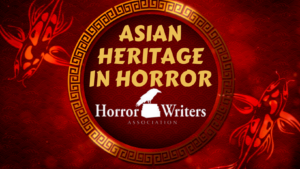Asian Heritage in Horror: Interview with Yvette Tan

 Yvette Tan is one of the Philippines’ most celebrated horror writers. She’s written two collections, one in English and one in Tagalog, a feature film, and a ballet libretto, among others. Waking the Dead, her English collection, has just been reissued with a new cover and an extra story. Her story “The Last Moon” was part of the Philippine pavilion’s design in the 2021 Frankfurt Book Fair. She is currently a creative consultant to a game that highlights Filipino mythological creatures. Her works have been translated into Spanish, Czech, and Hungarian.
Yvette Tan is one of the Philippines’ most celebrated horror writers. She’s written two collections, one in English and one in Tagalog, a feature film, and a ballet libretto, among others. Waking the Dead, her English collection, has just been reissued with a new cover and an extra story. Her story “The Last Moon” was part of the Philippine pavilion’s design in the 2021 Frankfurt Book Fair. She is currently a creative consultant to a game that highlights Filipino mythological creatures. Her works have been translated into Spanish, Czech, and Hungarian.
What inspired you to start writing?
I love reading, and if I had my way, I would spend my entire life doing just that. I started writing because I couldn’t find stories that I wanted to read, so I had to write them myself. This was back when Philippine lower mythology was unpopular and horror was thought of as lowly and unimportant. It’s different now, of course, and I’m glad that it is.
What was it about the horror genre that drew you to it?
I love the imagery and wordplay used in horror. That’s really how l found myself in this genre. That aside, I’ve always been interested in the weird and the supernatural. Growing up in the Philippines in the 80s, and partially during the Marcos dictatorship, when media was limited, the link between reality and the fantastic was sometimes tenuous. Because media was state-controlled, and Filipinos tend to be gossips, it was easy for news to take on a life of its own, sometimes becoming an urban legend.
Do you make a conscious effort to include Asian Diaspora characters and themes in your writing and if so, what do you want to portray?
I’m based in Manila, Philippines. Three of my grandparents are from Fujian, China and one is from the Philippine province of Bulacan. Though I grew up in the Chinese Filipino (Chinoy) community, I’d always felt out of place, as if everything I did was wrong. I don’t have a strong link to China and have always felt more Filipino, and this shows in my fiction as they’re very Filipino, except for one story that involves a Chinoy girl who stumbles on the ghost of a Mainland Chinese boy and has to learn about her heritage so that she can help him.
What has writing horror taught you about the world and yourself?
I’ve always been highly anxious (eldest daughter of an Asian family syndrome) and thus, fearful of the unknown. Horror has helped me express my emotions. I tend to be shy in person and decades of being trained to be seen and not heard (My mother’s dream for me was to become a trophy wife. Sorry, mom!) has made me tend to not talk much unless I’m comfortable with someone, but when I’m writing, I get to lay out all my thoughts without hesitancy or interruption. I actually didn’t know I was writing horror. A friend had to pull me aside and explain that what I wrote fit into the genre. That and when my first story was published (I had no plans of submitting my stories for publication but that same friend took one of mas tories, got it published, then told me after), my mom’s church mates told her it gave them nightmares, was my first inkling that horror didn’t need to be scary, just deeply unsettling.
How have you seen the horror genre change over the years? And how do you think it will continue to evolve?
Horror keeps finding a bigger and bigger following that embraces diverse themes and viewpoints, which I think is wonderful. We still need to move past the “horror equals scary” or “horror equals jump scare” trope but we’ll get there. I’ve actually upset people by saying that horror-comedy exists!
How do you feel the Asian community has been represented thus far in the genre and what hopes do you have for representation in the genre going forward?
I’m based in Asia so I’m not sure I’m qualified to answer this question, but I think there could be more Asian representation in Western horror, but at the same time, the internet has made everything so much more accessible—you can look for Asian horror for the Asian market. In Asia, wanting to be represented in Western horror could be seen as wanting to be recognised by colonial powers, but for Asians living in the West, it’s an extremely important quest for identity and representation. I hope to read more stories by POC, Asian or not, wherever they’re from.
Who are some of your favorite Asian characters in horror?
Arnold Arre’s Andong Agimat, from the graphic novel of the same name. Unfortunately, it’s in Tagalog, but his other graphic novels, though more fantasy than horror, are in English.
Who are some Asian horror authors you recommend our audience check out?
Budjette Tan’s Trese series, which has been turned in into an anime and is currently on Netflix. I think there are print copies in some bookstores in the US.
What is one piece of advice you would give horror authors today?
Keep writing. You’ll get a lot of pushback because everyone thinks their opinion is important, but the only opinion that should matter when it comes to what you should write the most is yours. That said, also learn to discern when what someone is saying is helpful and learn to be humble enough to take that advice and use it in a way that works for you.



